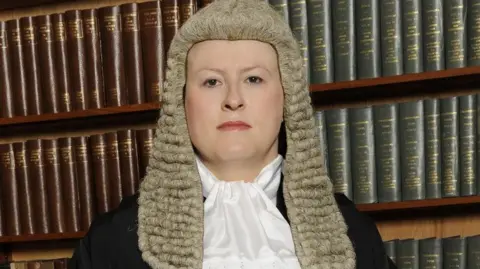**Transgender Judge to Challenge Ruling at European Court**
In a significant turn of events, Dr. Victoria McCloud, a former judge and the first individual in the UK to publicly identify as transgender within the judiciary, has decided to contest a recent ruling made by the Supreme Court concerning the definition of gender under the law. The case in question pertains to the Supreme Court’s decision that identifies “woman” strictly based on biological sex, igniting considerable controversy and debate across the UK regarding human rights and gender identity.
Dr. McCloud, who resigned from her judicial role last year, claims that the Supreme Court’s ruling and the following guidance from the equality watchdog infringe upon her human rights, leaving her feeling “contained and segregated.” She has voiced her discontent, stating that the judgment disregarded crucial human rights considerations pertinent to transgender individuals like herself. McCloud, who was a High Court Master, articulated feelings of cognitive dissonance regarding the dual classification of her gender—legally recognized as a woman, yet simultaneously deemed a man under the Equality Act—describing this situation as a legal absurdity.
Recently, the Supreme Court delivered a unanimous verdict indicating that women’s status is determined by biological sex. This determination has ramifications for spaces such as hospitals and retail settings, where new interim guidelines specify that transgender women, those assigned male at birth, are not permitted access to women’s facilities. These updates have been met with severe criticism from transgender rights advocates who argue they undermine the complexity of gender identity.
Many observers have noted the absence of transgender voices during the Supreme Court proceedings. Dr. McCloud and another trans candidate sought to present arguments directly related to the case but were denied this opportunity. While the court did consider arguments from the human rights organization Amnesty International, it largely opted not to include testimony from those specifically advocating for transgender rights.
At 55, Dr. McCloud has lived openly as a transgender woman since her twenties. She has legally changed her gender on official documents and gained significant status within the judiciary, where she aimed to serve as an emblem of diversity. However, she ultimately stepped down due to the growing backlash and public scrutiny she faced, which she described as increasingly intolerable.
In response to the Supreme Court’s ruling, Prime Minister Sir Keir Starmer described it as providing “much-needed clarity” for institutions creating guidelines. Conversely, Dr. McCloud has expressed that the ruling contributes to greater confusion and fails to adequately address how legal definitions are influencing the lives of transgender individuals. As a result, she intends to escalate the matter to the European Court of Human Rights in Strasbourg, seeking a formal declaration that the UK government’s actions and the ruling violate inherent human rights.
Dr. McCloud has furiously rebutted the court’s framing of biological sex, asserting a lack of definition provided in the ruling. She argues that the court has not adequately grasped the nuances of gender identity and its implications for individuals socially and legally. According to McCloud, a woman should be legally defined as someone who holds a female marker on their birth certificate, which reflects her own situation.
The implications of the ruling raise crucial questions about transgender rights and public safety. Advocates express concerns that the interpretation of the law could unintentionally expose vulnerable populations to harm, a sentiment echoed by Dr. McCloud as she cautions that dangerous individuals might exploit this ambiguity to harass or target women.
While the Supreme Court’s decision has garnered support from various sectors, notably those advocating for women’s rights, it poses significant challenges and conflicts for the transgender community. Dr. McCloud and her supporters call for a re-evaluation of how UK laws interact with human rights standards regarding gender identity—highlighting an ongoing debate that continues to divide public opinion.



